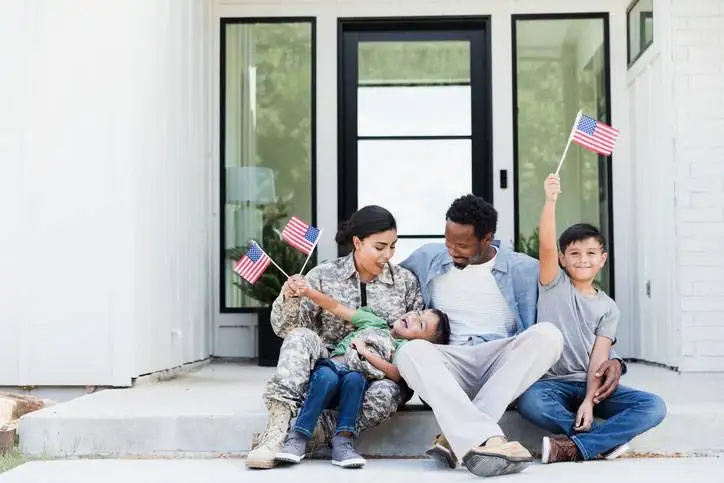
The appearance of U.S. Department of Defense (DoD) visual information does not imply or constitute DoD endorsement.
Benefits for military dependents are broad in scope, encompassing everything from education to healthcare, and are unquestionably valuable. How does earning a college degree on the government’s dime suit you? It’s possible with the outstanding benefits offered to military dependents. It pays to be a dependent of a service member or veteran!
Add learning more about what benefits military dependents get to the top of your priority list, and you won’t be disappointed.
But before you begin exploring benefits, you’ll want to make sure you’re eligible and prepared to reap the rewards offered to dependents of military service members and veterans.
Before answering the question, what benefits to military dependents get, there’s a few important points to clear up first.
Do I Qualify as a Military Dependent?
First things first – what is a dependent? In the eyes of the military (the Department of Defense, to be exact), a dependent of a uniformed service member includes a(n):
- Spouse (the military recognizes same-sex marriages and common-law marriages that take place in states that recognize common-law marriage)
- Unmarried child under the age of 21 (includes adopted children and stepchildren; stepchildren can only be considered dependents if the servicemember is married to the stepchild’s natural parent)
Secondary Dependents
But the military also recognizes “secondary” dependents. These include:
- Minor child (cousin, foster child, nephew, sister, etc.) under the service member’s legal custody or guardianship
- Unmarried child who is at least 21 but under 23 who is a full-time student and remains a legal dependent (relies on the service member for more than half of their support)
- Parent, sibling, adult child, and other family member incapable of self-support due to a mental or physical incapacity and relies on the service member for more than half of their support; family member must live with the service member unless placed in institutional care or separated by service
In these cases, the Defense Finance and Accounting Service (DFAS) needs to determine their dependency before they can be identified as secondary dependents.
Adding secondary dependents provides the service member with additional financial support in the form of increased Basic Allowance for Housing (BAH), travel allowances, and TRICARE coverage.
What Benefits Are Military Dependents Eligible For?
 Before you can qualify for virtually any benefits associated with being a military dependent, you’ll need to make sure you’re registered in the Defense Enrollment Eligibility Reporting System (DEERS), the military’s personnel system. Once you’re registered and you have a military ID card, you can begin exploring which benefits you’re entitled to.
Before you can qualify for virtually any benefits associated with being a military dependent, you’ll need to make sure you’re registered in the Defense Enrollment Eligibility Reporting System (DEERS), the military’s personnel system. Once you’re registered and you have a military ID card, you can begin exploring which benefits you’re entitled to.
Only the service member can add a dependent by visiting the nearest military ID card issuing facility. They’ll need to make an appointment and bring all necessary documentation with them.
Healthcare
TRICARE
- Who’s Eligible: All Dependents and Secondary Dependents of Active-Duty, Retired, or Deceased Uniformed Service Members, Guardsmen, and Reservists
Arguably the most valuable benefit in the military is TRICARE – the military’s health insurance provider. If you’re registered in DEERS, you’re eligible for TRICARE benefits, which include health, vision, dental and prescription coverage.
Benefits vary according to your beneficiary category.
CHAMPVA
- Who’s Eligible: Spouses and Children of Veterans Who Died in the Line of Duty or Veterans with Disabilities
If you’re a surviving spouse or child of a service member who died in the line of duty or a spouse or child of a veteran with disabilities, you may get your healthcare benefits through the Civilian Health and Medical Program of the Department of Veterans Affairs (CHAMPVA) program if you don’t qualify for TRICARE.
CHAMPVA isn’t as comprehensive as TRICARE, but it may cover some of your healthcare costs.
Education and Training
POST-9/11 GI BILL®
- Who’s Eligible: Spouses and dependent children of service members and veterans
 If you’re a dependent child or spouse of a service member or veteran, you may be eligible for educational benefits through the Post-9/11 GI Bill®. To receive benefits through the GI Bill®, the service member or veteran must transfer their benefits to you.
If you’re a dependent child or spouse of a service member or veteran, you may be eligible for educational benefits through the Post-9/11 GI Bill®. To receive benefits through the GI Bill®, the service member or veteran must transfer their benefits to you.
Educational benefits through the Post-9/11 GI Bill® include up to 36 months (depending on the amount of time the service member served in active duty) of benefits that cover up to 100% of the cost of in-state tuition, along with $1,000 annually for school supplies and, in some cases, a monthly housing allowance.
You may also receive additional funds through the Yellow Ribbon Program if you’re using Post-9/11 GI Bill® benefits and the school participates in the Yellow Ribbon Program. This program is designed to bridge the gap between the cost of tuition for out-of-state and private schools and the Post-9/11 GI Bill® tuition cap.
SURVIVORS’ DEPENDENTS’ EDUCATION ASSISTANCE (DEA) PROGRAM
- Who’s Eligible: Spouses and children of disabled, deceased, MIA, or POW vets
The Survivors’ Dependents’ Education Assistance (DEA) Program provides monthly benefit payments to help pay for the cost of post-secondary education and training.
Eligible recipients include children (ages 18-26, married or unmarried) and spouses of vets who are permanently and totally disabled due to a service-connected disability; died on active duty or as a result of a service-connected disability; are missing in action; or were forcibly detained or interned in the line of duty by a foreign entity.
FRY SCHOLARSHIP
- Who’s Eligible: Children of service members who died in the line of duty or children of members of the Selected Reserve who died from a service-connected disability after September 10, 2001
The Marine Gunnery Sergeant John David Fry Scholarship —more commonly referred to as the Fry Scholarship — offers tuitions benefits that mirror the Post-9/11 GI Bill®. These include up to 36 months of tuition payments, along with a monthly housing allowance and an annual stipend.
The Fry Scholarship is for children of service members who died in the line of duty after September 10, 2001, or for children of members of the Selected Reserve who died from a service-connected disability after September 10, 2001.
Children can receive these benefits once they turn 18 or graduate from high school, whichever comes first. Children who graduated from high school before January 1, 2013, can receive these benefits until they’re 33, and children of a member of the Selected Reserve who died from a service-connected disability while not on active duty can receive benefits through the Fry Scholarship at any time, regardless of how old they are.
LIFE INSURANCE
- Who’s Eligible: Spouses and dependent children
The Veterans Administration (VA) offers Family Servicemembers’ Group Life Insurance (FSGLI) for spouses and dependent children of service members and veterans.
You may be eligible for FSGLI if you’re the spouse or child of a service member who’s on active duty (including National Guard and Ready Reserve) and who is covered by Servicemembers’ Group Life Insurance (SGLI).
Survivor’s Pension, Retirement, and Compensation
VA SURVIVORS PENSION
- Who’s Eligible: Surviving spouses or children of veterans with specific wartime service
If you’re the surviving spouse or unmarried dependent child of a wartime veteran (specific wartime periods must be met), you may be eligible to receive monthly payments through the VA Survivors Pension.
Unmarried children are eligible for benefits if they’re under the age of 18; if they’re under the age of 23 and attending a VA-approved college; or if they’re disabled due to a disability that occurred before they turned 18.
Benefit amounts through the VA Survivors Pension program vary according to the recipient’s income.
SURVIVOR BENEFIT PLAN (SBP)
- Who’s Eligible: Surviving spouses and dependent children of veterans who elected to participate in the plan
If you’re a surviving spouse or dependent of a veteran who elected to participate in the Survivor Benefit Plan (SBP) upon retirement, you’ll be able to collect on a percentage of their retirement pay as a monthly benefit, up to a maximum amount of 55 percent.
This program is not available if your veteran spouse or parent did not elect to buy into it upon retiring and collecting retirement pay.
This continued annuity pays until your death as a spouse, or until the age of 18 if you’re a dependent child. The veteran can choose their spouse or dependent children as beneficiaries of this program.
COMPENSATION FOR SURVIVING SPOUSE AND DEPENDENTS (DIC)
- Who’s eligible: Surviving spouses, children, or parents of service members or vets who died in the line of duty or died from a service-related injury or illness
In addition to its specific service member/veteran eligibility requirements, DIC is available only to:
- Surviving spouses who lived with the service member or veteran until their death or who separated through no fault of their own (some remarried spouses may also qualify)
- Surviving children who are unmarried, under the age of 18 (or 23 if they’re in school), and not included on the surviving spouse’s compensation to qualify.
- Surviving parents (may be biological, adoptive, or foster) must meet specific income requirements to qualify
Other Benefits for Military Dependents to Explore
You may be eligible for a wide range of benefits that extend beyond what the VA or DoD offer. Businesses often offer discounts on everything from hotel stays to retail purchases to theme park admission for military spouses and dependents, and many organizations offer military dependent-specific scholarships that are worth looking into.
And if you’re a current or aspiring college student, you’ll also find that most military supportive colleges and universities offer dedicated resources, services, and discounts to military spouses and dependents.





